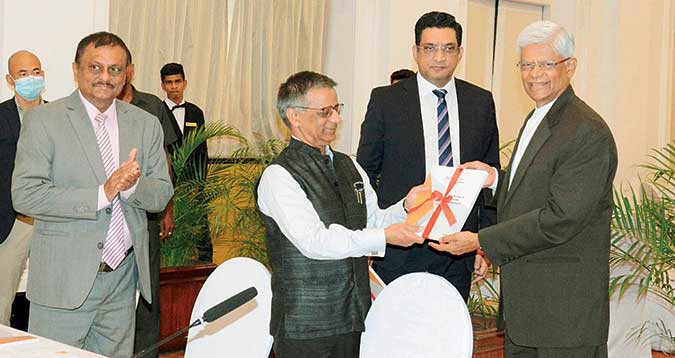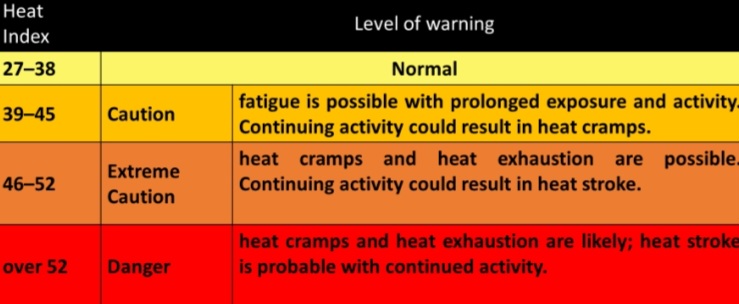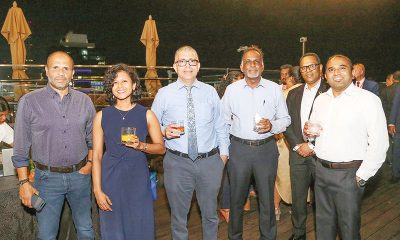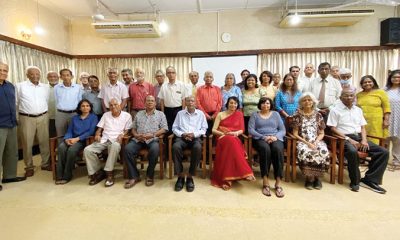News
Pathfinder proposes a Medium and Long-term Strategy for Economic Transformation of Sri Lanka with Indo-Japanese Collaboration

The official launch of the Report on “A Medium and Long-term Strategy for Indo-Japanese Collaboration to Support the Economic Transformation of Sri Lanka”, prepared by the Pathfinder Foundation with the assistance of a panel of experts, was held, in Colombo, last week. Foreign Minister, Ali Sabri, was the chief guest while Indian High Commissioner Gopal Bagley, and Japanese Ambassador Mizukoshi Hideaki were also present.
The event was organized in collaboration with the International Trade Centre (ITC), Geneva and attended by representatives from several government and private sector agencies. Bernard Goonetilleke. Chairman, Pathfinder Foundation; handed the Report to Minister Ali Sabry, a Pathfinder news release said.
The report has suggested a strategic response to transforming the economy, focusing on four priority sectors in which Indo-Japanese collaboration is sought to put the country on a sustainable growth trajectory for a structural shift, it explained.
In his welcome remarks, Pathfinder Chairman Bernard Goonetilleke, while thanking all the experts who contributed to the report, highlighted that two countries – India and Japan as very close development partners of Sri Lanka, who have much to contribute to reviving Sri Lanka’s economy.
He added, “India’s interest in the welfare of the country and its people was evident in the granting of generous credit and other facilities amounting to almost 4.0 billion US dollars in the recent past to overcome the economic crisis. Likewise, Japan has been a country which had generously provided economic support going back many decades”.
Foreign Minister Sabry highlighted some important points for consideration. He urged all think tanks, such as Pathfinder Foundation, to look into areas a typical politician would not comprehend and push for necessary changes. He also reiterated that a politician should have the humility to listen and learn from experts on the subject, encouraging think tanks to engage with the public and share populist policies.
High Commissioner Bagley pointed out that Sri Lanka occupies a unique place in India’s foreign policy mainly due to India’s neighbourhood-first policy. He added that India stands ready to assist Sri Lanka in overcoming the current economic crisis. Ambassador Hideaki also expressed his sincere hope that this year will be the beginning of an economic revival providing a springboard for future development for Sri Lanka. He also mentioned that Japan had been a long-standing partner in Sri Lanka’s socioeconomic development.
Before the report’s launch, Dr. Dayaratna Silva, Executive Director of the Pathfinder Foundation, introduced the 120-page report explaining its main thrust and the rationale for sector selection as the key drivers for structural transformation of the economy. Sector experts made presentations at the technical sessions covering the role of the four sectors in transforming the economy, existing policy framework gaps, and key recommendations for triangular cooperation.
The topic of session one was Low–Carbon Power Generation, which discussed renewable energy, LNG and the utility of grid – connectivity between Sri Lanka and India. The lead speaker of the session, Eng. Gamini Senanayake provided important perspectives on the subject. The second session covered the Development of Trincomalee as an Energy Hub, presented by Mr. T.F. Nimal Perera and Prof. I. M Dharmadasa who joined the event via Zoom and contributed his ideas on the future of green energy and issues relating to the proposed nuclear power generation in Sri Lanka.
Technical sessions continued with Mr. Rohan Masakorala and Dr. Dimantha De Silva (via Zoom) explaining their recommendation on the Logistics and Connectivity sector, which included ports, railways, airports, and ferry transportation. The final session included valuable insights on Education by Prof. Siri Hettige, followed by recommendations for the Tourism sector by industry experts Dr. Vipula Wanigasekara and Dr. Malraj Kiriella. The technical sessions concluded with Eng. Sena Peiris and Mr. Nihal Cooray, speaking on an important topic of “Training and skills development”.
News
Navy act promptly to douse fire on fishing trawler anchored in Galle harbour

The Navy taking prompt action were able to douse a fire that broke out on a fishing trawler at the Galle Fisheries Harbour on 14 Apr 25.
The blaze was first spotted by personnel on board SLNS Prathapa, stationed nearby. Acting swiftly, a diving team from the Southern Naval Command, along with harbour security personnel, rushed to the scene.
Their initial efforts focused on separating the trawler that had caught fire to prevent the flames from spreading. With the situation under partial control, the fire extinguishing system of SLNS Prathapa was activated, successfully dousing the remaining flames, through coordinated efforts of the diving and harbour security personnel.

Latest News
Heat index at ‘Caution level’ at some places in Northern, North-central, North-western, Western, Southern and Eastern provinces and in Rathnapura and Monaragala districts

Warm Weather Advisory
Issued by the Natural Hazards Early Warning Centre of the Department of Meteorology at 3.30 p.m. 16 April 2025, valid for 17 April 2025
The general public are warned that the Heat index, the temperature felt on human body is likely to increase up to ‘Caution level’ at some places in Northern, North-central, North-western, Western, Southern and Eastern provinces and in Rathnapura and Monaragala districts
The Heat Index Forecast is calculated by using relative humidity and maximum temperature and this is the condition that is felt on your body. This is not the forecast of maximum temperature. It is generated by the Department of Meteorology for the next day period and prepared by using global numerical weather prediction model data.
Effect of the heat index on human body is mentioned in the table below and it is prepared on the advice of the Ministry of Health and Indigenous Medical Services.

ACTION REQUIRED
Job sites: Stay hydrated and takes breaks in the shade as often as possible.
Indoors: Check up on the elderly and the sick.
Vehicles: Never leave children unattended.
Outdoors: Limit strenuous outdoor activities, find shade and stay hydrated. Dress: Wear lightweight and white or light-colored clothing.
Note:
In addition, please refer to advisories issued by the Disaster Preparedness & Response Division, Ministry of Health in this regard as well. For further clarifications please contact 011-7446491.
News
Hulftsdorp killing has led to checks on lawyers in some court premises

The government, in consultation with the Judicial Service Commission (JSC) and the Bar Association (BASL), has put in place a system to check lawyers entering selected courts. This follows the killing of Ganemulle Sanjeewa by an underworld hitman, masquerading as a lawyer, in one of the Magistrate Courts at Hulftsdorp, on the morning of 19 February.
Responding to The Island queries in this regard, Justice Minister Harshana Nanayakkara yesterday (16) confirmed the new security arrangement. Minister Nanayakkara, who is also an Attorney-at-Law, declined to elaborate.
Although the police apprehended the suspected assassin, a couple of hours later, the woman, who smuggled in the firearm used in the killing, also masquerading as a lawyer, is still at large.
Newly elected BASL President, Attorney-at-Law Rajeev Amarasuriya, said that scanners had been installed at selected places in line with the security arrangements introduced, following the 19 February shooting in a court. Amarasuriya said so responding to The Island query regarding the post-Hulftsdorp Court complex shooting developments.
The BASL Chief emphasised the pivotal importance of ensuring, what he called, a hassle-free environment for law officers, regardless of security checks necessitated by the latest shooting. Amarasuriya said that security measures should be in place in accordance with threat assessments pertaining to cases taken up at various courts.
The first courtroom killing took place in Nov. 1991 when Sub Inspector Dhammika Amarasena, who had been interdicted over the Wavulkelle massacre, was shot dead while inside the Attanagalle Magistrate court. Amarasena’s father-in-law, who had been seated next to the interdicted policeman, was also killed.
The second courtroom shooting happened in January 2004 when an Army deserter shot dead Dhamamika Amarasinghe inside the Hulftsdorp court complex. Although Dhammika Amarasinghe’s killer gained entry to the court, posing off as a law student, authorities never implemented a comprehensive security plan. However, in the wake of Ganemulle Sanjeewa’s killing, acting IGP Priyantha Weerasooriya, who is also a lawyer, underscored the need to check law officers.
The BASL President said that they were still in the developing stage of the security set up, taking into consideration views expressed by various stakeholders. Referring to Ganemulle Sanjeewa’s assassin carrying a forged BASL identity card, Amarasuriya stressed the need to use technology in counter measures to thwart such practices.
By Shamindra Ferdinando
-

 News6 days ago
News6 days agoSuspect injured in police shooting hospitalised
-

 Features7 days ago
Features7 days agoRobbers and Wreckers
-

 Business7 days ago
Business7 days agoBhathiya Bulumulla – The Man I Knew
-

 Business6 days ago
Business6 days agoSanjiv Hulugalle appointed CEO and General Manager of Cinnamon Life at City of Dreams Sri Lanka
-

 Features5 days ago
Features5 days agoLiberation Day tariffs chaos could cause permanent damage to US economy, amid global tensions
-

 Business5 days ago
Business5 days agoMembers’ Night of the Sri Lanka – Russia Business Council of The Ceylon Chamber of Commerce
-

 Features5 days ago
Features5 days agoMinds and Memories picturing 65 years of Sri Lankan Politics and Society
-

 News6 days ago
News6 days agoLankan security forces Humanitarian Assistance and Relief Team working in Myanmar












